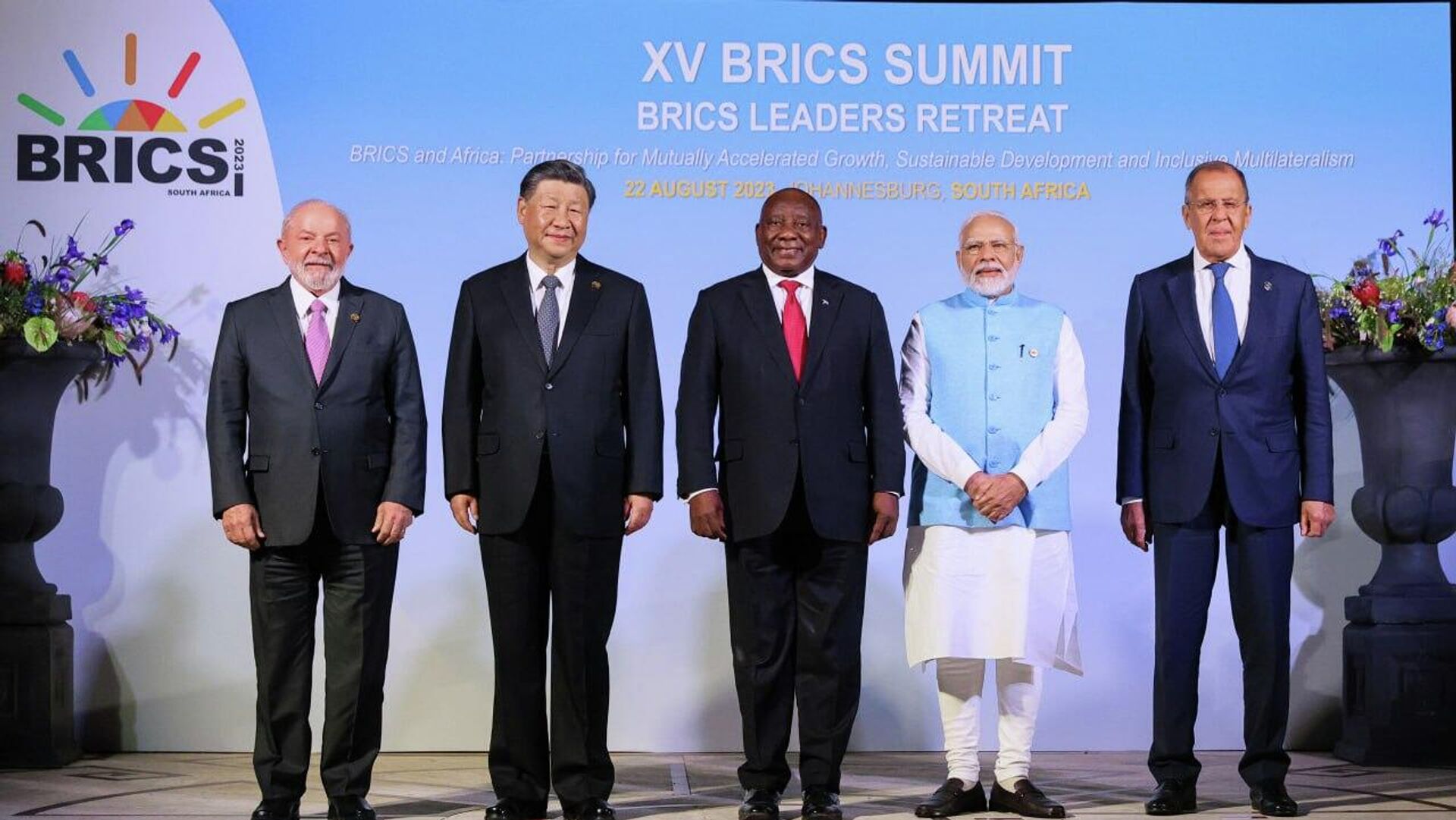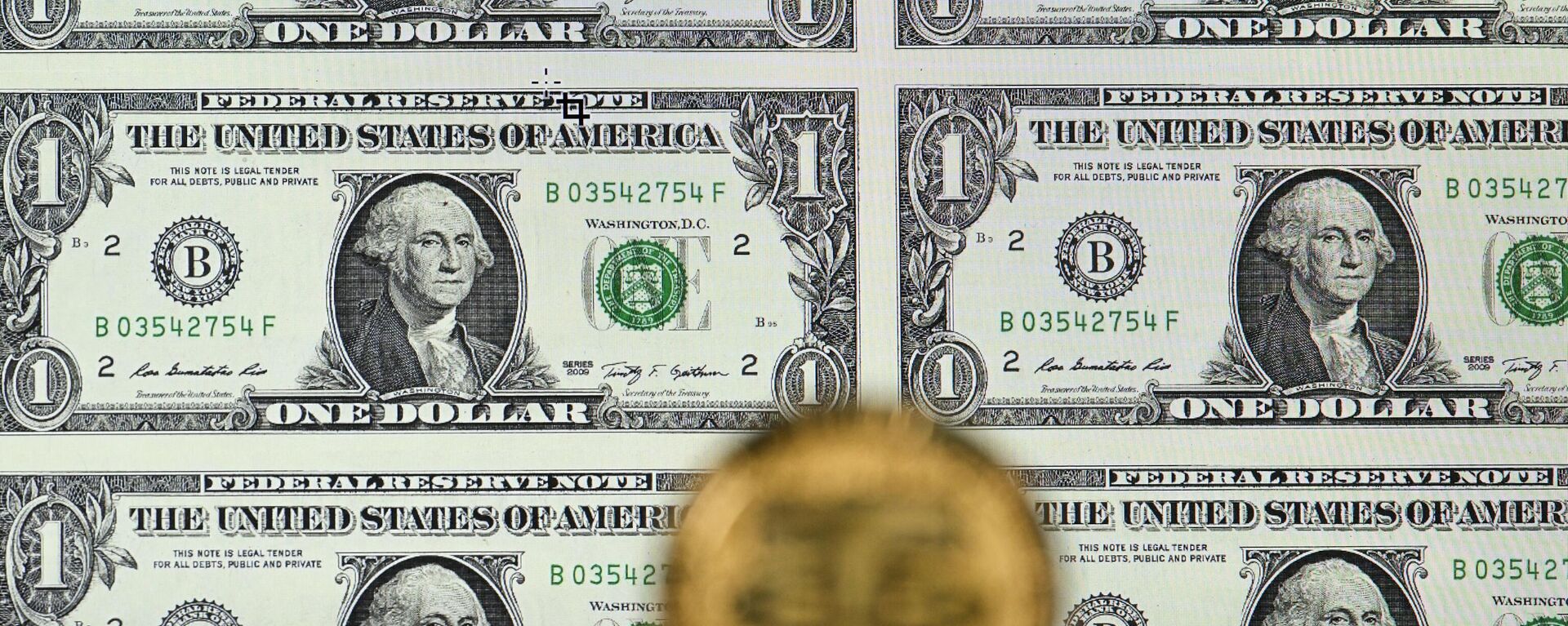BRICS Nations Unanimously in Favor of Democratizing Current World Order
00:54 23.08.2023 (Updated: 11:39 23.08.2023)

© Photo : Russian MFA
Subscribe
The BRICS Business Forum was addressed by South African President Cyril Ramaphosa, Brazilian President Luiz Inacio Lula Da Silva, Russian President Vladimir Putin (virtually) and Indian Prime Minister Narendra Modi. Chinese President Xi was represented by a delegate.
The BRICS nations are unanimously in favour of democratizing the global economic governance model and firmly opposed to unilateral measures that disrupt the global economic flows, Indian experts have told Sputnik India after the conclusion of the XV BRICS Summit Business Forum at Johannesburg’s Sandton Centre on Tuesday.
“BRICS is the hope for the future for many developing countries in the Global South. As the G7 and other western-led financial institutions will continue to decline, BRICS will continue to increase in importance,” said Dr. Sandeep Tripathi, the Founder President of the Forum for Global Studies (FGS).
Tripathi, who is also an Assistant Professor at Sharda School of Humanities and Social Sciences, Sharda University, said that the BRICS-backed New Development Bank (NDB) is now being truly viewed as an alternative to the International Monetary Fund (IMF) and World Bank.
“Prime Minister Modi’s speech at the BRICS Business Forum indicated that India is truly excited to be part of the NDB. India seems excited to invest its effort and resources in further expanding the NDB to other developing nations,” Tripathi said.
BRICS Nations Reaffirm Push for De-dollarization
Tripathi reckoned that than an important part of democratizing global economic governance involved moving away from the US dollar and trading in national currencies.
“The US dollar has been used as a tool of war. There is a real threat of US dollar being used as a war weapon among developing nations,” he said.
Significantly, Russian President Vladimir Putin told the Forum during his address that de-dollarization has emerged as an “irreversible trend” among BRICS nations.
The Indian expert suggested that the Indian Prime Minister has also made it clear through his speech that New Delhi was willing to set aside its bilateral differences with China in favor of enhanced cooperation at multilateral fora, like BRICS and G-20.
“India has already made it clear that it doesn’t want bilateral issues (Ladakh border dispute with China) to be discussed at multilateral forums. So, it wont be a stumbling block in cooperation at BRICS. India has also been firm that it wont brook any interference in resolving the border dispute,” Tripathi stated.
In his address at the BRICS Business Forum, Prime Minister Modi said that BRICS nations have an “important role” to play in the global economic architecture amid the Covid-related economic disruptions and geopolitical tensions.
Modi also called for increasing collaboration among BRICS nations, as he showcased India’s economic progress and its stature as the world’s fastest growing major economy amid economic headwinds.
BRICS Opposed to Unilateral Measures
Dr Raj Kumar Sharma, Maharishi Kanad Fellow at Delhi School of Transnational Affairs, University of Delhi, told Sputnik India that the remarks by BRICS leaders suggested that the five-nation grouping would “stand for spirit of inclusion and diversity and oppose any unilateral measures that go against the spirit of global governance”.
“Ideas closer to Global South would be echoed by BRICS in coming years,” stated Sharma, expressing confidence that BRICS would continue to develop as a grouping which is based on “ideas like equality and justice.” “At the same time, BRICS would also seek reform of global governance institutions like the World Bank, IMF and the UN Security Council which are West-dominated,” Sharma remarked.
Further, Sharma is of the view that business formed the “real basis” of partnerships between countries in the era of glpobalization.
“Trade plays an important part in deepening partnerships between different countries and people-centric trade policies always have a better chance of success and in creating economic cooperation,” he said.
He reckoned that India’s expertise in digital technology, fintech, and infrastructure creation could serve as a model for other emerging economies.
“India’s trade with other fellow BRICS countries is in excess of $150 billion. India is one of the leaders in digital technologies and is world leader in global digital payments. Financial inclusion is at the heart of India’s digital transition. Such Indian infrastructure is an asset to the countries which want to learn from Indian experience including India’s BRICS partners,” Sharma said.
BRICS Leaders Calls for Greater Economic Cooperation
Dr. Anuradha Chenoy, a retired Professor of the Centre for Russian and Central Asian Studies at Jawaharlal Nehru University (JNU), noted that all the BRICS leaders in a way or the other called for greater economic cooperation among the five nations and among other developing nations.
“President Putin spoke of the increasing share of trade in national currencies and that the share of the USD is declining. He committed to supporting food security for many African countries in need,” she stated.
“President Ramaphosa stated that the BRICS leaders would have a conversation on increasing trade in national currencies. He was critical of the WTO and asked for the creation of a new global financial architecture,” added Chenoy.
The Indian academic said that China's remarks at the BRICS Business Forum emphasized that China was “opposed to hegemonic powers and would never be a hegemonic power itself”.
“All the leaders emphasized on connectivity and were confident of greater links between the BRICS as also the legitimacy of this Forum,” she emphasized.
Further, Chenoy said that the speeches at the Business Forum showed that the concerns of the BRICS countries were different from other blocs.
“The Business Forum expressed concerns and paid attention to the rising inequality, the need to address poverty, and unemployment. The Business Forum also said that the common concerns of BRICS were different than those of other established blocs and the understanding between BRICS business groups could create their own alternative institutions and structures in addition to the New Development Bank,” she said.


